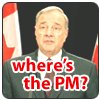Accusations of media bias are quite common in the blogging world. One of the great benefits of blogging, of course, is that it provides one with the opportunity to counter such bias. That is, if you have an audience.
The epithet mainstream media or MSM is typically used in a condescending fashion in blogging discourse. Certainly, bias is in the eye of the beholder, but in my opinion, media coverage of political events surrounding the recent constitutional crisis and the subsequent confidence vote suggests that criticisms of the Canadian mainstream media have some basis in fact.
In the interests of full disclosure, I should first tell you where I am coming from. Throughout most of the 1980s and 1990s, I was an off-and-on member of the Liberal Party of Canada, even periodically donating small amounts to their cause. However, as the Chrétien reign wore on, I became increasingly uncomfortable with the actions of the Chrétien government and its implications for Canadian democracy. Prior to the 2000 election, I joined the Canadian Alliance and made a small donation to both the Canadian Alliance and Progressive Conservatives. In the last election, I helped my local candidate and friend Patrick Clune run for the Conservatives.
I find it rather curious that in the investment world, portfolio managers and analysts are required to disclose any conflicts of interest when discussing an investment, and yet no such requirement exists for our political news. What does it say about our democracy when disclosure of potential conflicts of interest is considered critical for our investment decisions, but deemed of insufficient importance for our electoral decisions? Something is definitely askew.
For example, David Asper recently questioned Stephen Harper’s leadership in the National Post, repeating Liberal talking points almost verbatim.
And Harper's alliance with the separatists in Parliament has made the Conservative leader look like a man willing to risk national unity for his own self-aggrandizement. Accepting the Prime Minister's offer to hold a winter election would have avoided his having to play footsie with Gilles Duceppe.
If Mr. Harper were to focus on educating Canadians about the merits of a fiscally conservative agenda, his party might have a good opportunity next time we go to the polls. But he must also be politically savvy. And thus far, he has shown a tin ear for the way most ordinary Canadians want to spend their summer.
As a result, Mr. Harper is putting the credibility of his leadership and his party at issue. And today, when Canadians see Mr. Harper voting in favour of a budget that he might have helped push through Parliament weeks ago, even many of his supporters will ask themselves whether he is a man they want to become prime minister.
What Asper fails to disclose in his little diatribe against Stephen Harper is that he, his family and his company, CanWest Global, are major contributors to the Liberal Party. Asper family members at David Asper’s postal code donated $8,469 to the Liberals during the last election, and CanWest Global donated $100,000 to Paul Martin’s leadership campaign. Moreover, Asper family and CanWest Global donations to the Liberal Party totalled more than $120,000 in the 2001 to 2003 period, while donations to the Canadian Alliance were only $32,800 over the same period.
The idea that this guy might have a conflict of interest that should be disclosed does not seem to have crossed his mind. David Asper is far from a neutral, or even an opinionated, commentator. He is tainted by a serious conflict of interest such that he really has no business criticizing Stephen Harper or the Conservative Party. In fact, his “column” can more accurately be described as plug for the Liberal Party. As such, it should be reported to Elections Canada as an in-kind donation to the Liberal Party.
Unfortunately, this is but one example. Our entire media is conflicted. The CBC is almost entirely dependent on the goodwill of the current government for the majority of its budget. Is it any surprise which way it leans?
BCE Inc., which owns the CTV network and the Globe and Mail through Bell Globemedia, contributed $267,000 to the Liberals in the 2001 to 2003 period and gave another $59,000 to Paul Martin’s leadership campaign. In contrast, its donations to the Canadian Alliance and the Progressive Conservatives totalled $112,270 over the same period, with another $5,000 going to the Bloc Quebecois.
Ostensibly, new campaign financing laws will put an end to the unseemly practise of Canadian media companies donating to the governing party. But as the Gomery inquiry has shown, the law did not prove to be a significant impediment to Liberal Party fund raising practises in the past.
My prediction is that efforts by the media empires to support the ruling party will simply go underground. While it may not involve brown paper bags filled with cash, the temptation for Canadian media companies to shape their news and editorial content to please the government will be hard to resist.
For example, Bell Canada – a subsidiary of BCE Inc. – is currently appealing an unfavourable CRTC decision on internet telephony to the federal cabinet. Am I the only one thinking that more favourable coverage of the Paul Martin government in the Globe and Mail and on CTV would improve their chances of success? David Asper doesn’t seem to think so.








